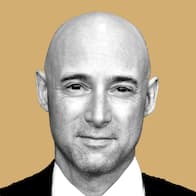You’re reading the Prompt 2024 newsletter. Sign up to get it in your inbox.

With me are my colleagues Michele L. Norris and Ramesh Ponnuru, and I can tell you their mics have not been silenced.
💬 💬 💬
Matt Bai: That was a pretty brutal and nasty debate, no? We always talk about these debates in terms of winners and losers, which I think lacks nuance because really it’s possible for both candidates — or neither of them — to reach the voters they’re trying to reach. So let me ask it this way: Which of the candidates did what they needed to do? Michele, start us off, please.
Michele Norris: Kamala Harris did exactly what she needed to do. She controlled the debate from the minute she walked onstage, approaching a man who is almost a foot taller than her and introducing herself. She appeared stronger, larger in stature, more specific of substance, more composed in the face of lies and outright attacks, more optimistic while the former president was talking about a broken and beaten down America. And she made clear this is a change election in which she represents an opportunity to turn the page with a new generation of leadership. I worked in radio for years, so I am always attuned not just to the split screen — where she clearly had advantages — but also to those people who are listening and not really watching what they see. She dominated in terms of tone and specificity: Calm, confident, composed. I know you don’t want to talk about winners and losers, Matt, but there is a clear winner here, and we need to just go ahead and call this night for what it is. She was dominant in every sense.
Matt: Agree, Ramesh?
Ramesh Ponnuru: Going in, I thought that because almost all Americans have decided views about Trump and some people are not sure what they think about Harris, it would be strategically wise for each of them to focus on creating an impression of her. Instead — like nearly everything else in our politics for the last decade — it was mostly about him. I think she did a better job of prosecuting him than he did on defense. But I also think she missed a chance to explain her political evolution and present herself as a sincere centrist.
Matt: So, I certainly agree that this was not a good debate for Trump. The longer it went, the more unhinged he seemed to be. Whether that surprises anyone at this point, I don’t know. As for Harris, I get the sense from texts and TV that a lot of supporters agree with you, Michele. And I think she did herself no harm, which is something. But like you, Ramesh, I have to break with the overwhelming reaction a bit, because I also think she missed an opportunity to tell her own story in a way that inspired people and gives independent voters a reason to feel good about her. They were 40 minutes in before she discusses her mother, and she never made the point that she is the child of immigrants. This debate was largely about her and the third or so of voters who said they wanted to know more about who she is. They didn’t learn as much as they should have, in my view.
Michele: I disagree that this was a missed opportunity to present her biography. The Democratic convention was the moment for that. Debates require something different, and I think people by now know that Kamala Devi Harris is the child of immigrants. She used the stage to make the case that she he is a child of the middle class and will fight for middle-class Americans. One of the objectives in a moment like this is framing the argument going forward. Her language around the “opportunity economy” and the “new generation of leadership” and the notion that she will be a “president for all people” were quite strong.
Matt: Well, the polls tell a different story about what people know. Or at least the people she needs to win. Most voters didn’t watch her convention speech, and this was the biggest stage she’s had. I thought Harris had her best moments, and Trump his worst, on foreign policy, which I might not have expected. She had a great answer about world leaders laughing at the former president, to which he responded by again citing his friendship with Hungarian Prime Minister Viktor Orban. And I thought it was remarkable Trump wouldn’t say he wanted Ukraine to win its war against Russia. Generally, I thought the two candidates diverged as the night went on; she got more sure-footed, and he became more agitated.
Ramesh: On Ukraine, I thought that she looked forceful, and he looked evasive. But I actually thought her best moment was when she was asked about Trump’s claims about her racial identity. She could easily have spoken about the personal affront but instead spoke about how Trump delights in division, and I thought she did it quite well.
Matt: Were there other moments that stood out to you two?
Ramesh: Yes. Trump’s refusal to commit to vetoing a national ban on abortion, which I would not be surprised if he revisited. And all of the moments that Harris successfully goaded Trump into talking about things that could not possibly help his campaign, notably the question of who has better rallies and the alleged victimization of Jan. 6 rioters. Oh, and from the opening of the debate, when Harris had no answer on whether Americans are better off than they were four years ago.
Matt: Michele?
Michele: A few things come to mind. The vice president clearly got under Trump’s skin when she suggested that people were leaving his rallies early out of boredom. We knew ahead of this that she knows how to throw a punch. She confirmed this when she turned to him and calmly said, “Donald Trump was fired by 81 million people. ... Clearly he is having a very difficult time processing that.” One last thing, in their closing arguments, Harris aimed hers at the audience. Donald Trump gave up the moment by going on the attack one last time. A missed opportunity for him.
Ramesh: I thought Trump’s closing statement had a strength and a weakness. If I’m right that the strategic opportunity for both of them was to define her for undecided voters, then it made sense for him to make it negative. But it also made some points against her that would have been better deployed earlier in the night.
Michele: We often talk about split-screen moments in elections. There was a clear contrast between the two candidates in the room, but there was another split-screen moment outside the debate hall: Taylor Swift’s decision to drop her endorsement of Harris tonight of all nights. In a race that will be largely determined by the turnout of White women who supported Donald Trump in the past two elections, that endorsement is not a run-of-the-mill celebrity endorsement.
Matt: I agree, Michele. Not a lot of endorsements matter, but that one might. Maybe it’ll put Missouri in play!
Ramesh: So tempted to make a Dad joke about how the race is not always to the swift.
Matt: If 16-year-old girls could vote, this election would be over tonight.
Michele: We have not talked much about abortion this evening, and I must say that Harris — who is always strong when talking about this issue — was particularly effective talking about anecdotal Americans whose lives have been upended by the Supreme Court’s Dobbs decision. The 12-year-old victim of incest who has to carry a child to term. The woman bleeding out in the parking lot because doctors were unsure whether they could treat her. I invite people to go back and look at that passage. Trump was looking down looking uncomfortable. This was not just a policy debate; she brought women into the room.
Matt: She was strong on that issue. I was also reminded that it’s harder to be a woman on that stage. There were times when she really should have been able to cut Trump off or flash some anger, but I think she felt she had to be careful about that. I mean, he attacked her father in the first 10 minutes. She did an admirable job keeping her composure, and I’m not sure she should have had to.
Michele: There is a famous quote that politicos often cite in debate prep: He who angers you conquers you. Wrong pronoun in this case, but she angered him. She goaded him. She pummeled him with facts. She pulled him off course. And she did it in a way that was fully authentic. But here’s the thing: He, too, was authentic. Both people showed up as themselves, and the contrast could not be more clear.
Ramesh: Speaking of the split screen: When he spoke, she mostly looked amused and disbelieving. When she spoke, he mostly looked mad. I have to think that contrast both played in her favor and tells us something about how the debate went.
Matt: Michele, one last question. Is there anything at all that you think she didn’t do brilliantly on Tuesday? Any place where he got the better end of things?
Michele: Her nerves might have been evident at the beginning, but she finished strong. And while some might hunger for more specifics (a common refrain) in what she described as an opportunity economy, she provided a much clearer picture than her opponent who spoke of having “a concept of a plan.” Matt, this was plain and simple a rout. She carried the night.
Matt: Well, if it was a rout to the viewers, we’ll know that in a few days. And if so, the election could get beyond Trump’s reach. But that’s a conversation for another day.
An earlier version of this column incorrectly stated that Vice President Kamala Harris had not mentioned her mother until 40 minutes into the debate. Harris mentioned her mother during her first answer.


